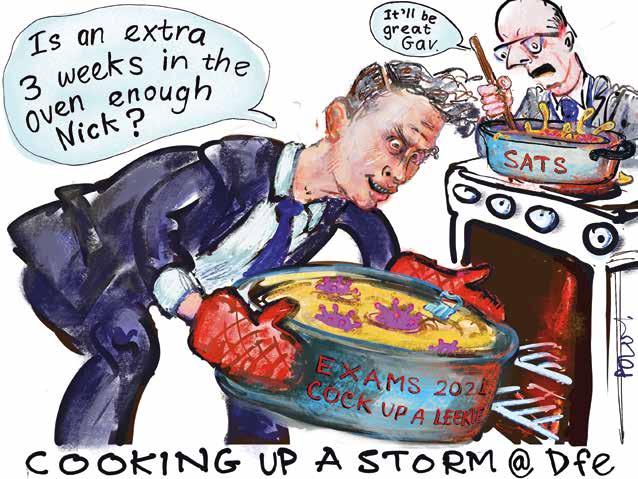
7 minute read
Polly Donnison & Warwick Mansell
Cartoon by Polly Donnison
Whatever Nick Gibb wants, Nick Gibb gets…
Warwick Mansell is a freelance education journalist and founder/writer of educationuncovered. co.uk
“TEACHERS… are the professionals best placed to decide how and what is taught in schools.” So wrote Nick Gibb – the relentlessly traditionalist-minded schools minister who has been at the helm of our education system throughout most of the past ten years – in a blog post in 2015.
Yet there has been a constant tension between what ministers say is their preference for promoting autonomy within teaching and the reality. Politicians – seemingly led by Gibb, who has been a key ideological presence at the Department for Education (DfE) since Michael Gove was sacked in 2014 – appear happy to let professionals get on with it… so long as they follow ministerial preferences.
The latest case of the DfE using its power to try to manoeuvre the profession in its favoured direction was the award of a contract through which two groups of academy trusts will be funded to provide training to other school leaders, on what it calls an Exemplary Leadership Programme.
In return for up to £250,000 a year, the trusts will deliver training which will be “grounded in a knowledge-rich curriculum, high expectations for all pupils, direct instruction and strong behaviour management”.
While few would quibble with “high expectations”, all three other aspects quoted above are subject to intense professional debate – and promoted enthusiastically by Gibb.
In that 2015 blog, for example, Gibb wrote that “for decades”, English education had been characterised by “student control over learning” – the opposite of “direct instruction” by the teacher – and this “had been disastrously partnered with a curriculum seemingly devoid of all knowledge and content”. Gibb also backs “no excuses” behaviour policies.
Sceptics might ask what the problem is with ministers using public money to promote their own ideas, which may indeed be backed by parts of the profession, and which research may support. The counter-argument is that this influence over the detail of what happens in schools is being conducted away from scrutiny – without the debate that follows, for example, when the national curriculum is changed.
In this arena, claims can be made without transparency. A presentation to potential bidders for this “exemplary leadership” cash, for example, once again stated that programmes must include a “knowledge-rich curriculum”, “direct instruction” and “strong behaviour management”. This is simply because, the presentation stated, “schools with high behavioural and academic standards, supported by strong systems and a culture of support and challenge, are best for teachers and pupils”. No supporting evidence is provided.
This just seems a case of “this is what the minister wants” – no official scrutiny, challenge or oversight.
The word “exemplary” has also annoyed quite a few teachers, especially given that one of the chains favoured for this cash operates, my analysis of DfE data suggests, a school which in 2018-19 permanently excluded more children in a single year (eight) than any other on record.
As ever with the DfE, the political preferences of those in charge are not exactly difficult to discern. If not quite a case of “direct instruction” to schools from Mr Gibb, this seems not far from it.
Writing from the heart
Tobias Hayden (pictured at conference) is a year 4 teacher and writing coach at a primary school in Barking and Dagenham, east London. Max Watson finds out what makes him a class act.
TOBIAS is passionate about what he describes as a “transformational approach” to engage pupils in writing for pleasure.
“Year after year I was becoming increasingly weary of the approaches being promoted in primary schools, which did not speak to my desire to develop children as writers, or find a way to give them a voice,” he tells Educate.
That changed a couple of years ago when he discovered the work of Young and Ferguson
Year 4 pupil
and their Writing for Pleasure manifesto (writing4pleasure.com). He also took part in the University of Sussex’s research project, What is it ‘Writing for Pleasure’ teachers do that makes the difference? (Young 2019).
“I had struggled in class with all the hitherto existing writing pedagogies, but it quickly became clear this was a truly transformational approach.”
Phenomenal variety of ideas
Tobias introduced the approach into his teaching through persuasive letter writing. “The variety of ideas was phenomenal,” he says. “A plea to the council to abandon a new parking scheme and an appeal to a

Do you know a class act?
If you know someone who is a class act, send their details to educate@ neu.org.uk
little sister to stop disturbing one child’s sleep stand out. It also had a noticeable impact on the children’s understanding that writing for a real audience, and from the heart, can make a contribution to the world around them – no matter how small.”
He also introduced personal project books. “I’ve discovered more about the children in my class through their writing in just a few weeks than I had learned about some in an entire year. As the year develops, the children begin to embrace a writerly existence, and these books inhabit their homes just as much as their school desks.”
Unleashed from a straitjacket approach
Pupils respond well, showing “a significant increase in motivation, ownership, independence, confidence, writer-identity, enjoyment and satisfaction”.
Tobias explains: “Unleashed from a straitjacketed approach, the children are able to take an idea that they truly care about and see it through to publication. It’s this combination of emotional connection and wanting their writing to do well that results in children producing texts that are both compositionally and transcriptionally of the highest standard.”
Don’t just take his word for it. One year 4 child said: “We don’t have to write what the teacher says. It’s actually better if you choose, because you know what you’re going to write about.”
Another agrees: “If I never wrote, life would be a bit boring. Having loads of thoughts but never being able to show them...”
During lockdown, Tobias encouraged his class to continue writing.
“One girl wrote a breathtaking eulogy to her father, which would never have happened had she not been given the agency to choose her own writing topic. It had the added benefit of promoting talk and shared composition among her family. Writing for Pleasure is a community approach in every sense.”
Tobias is a fervent advocate for the wider adoption of a Writing for Pleasure pedagogy.
“It would contribute greatly to the restoration of the primacy of human relationships to the teaching process, repelling the feelings of alienation engendered by ‘off the shelf’ writing schemes.”
@TobiasHayden
Wellbeing Hut for parents and pupils to learn together
THE community at St John the Baptist Primary School in Stockton-on-Tees had a particularly good reason to celebrate World Mental Health Day in October with the opening of a new Wellbeing Hut.
Thanks to a £4,500 grant from the Healthy Pupils Capital Fund, the school in County Durham was able to buy the hut, put it up in the school garden and deck it out as a bright and welcoming space.
The school already runs a lot of family classes and family-led learning, with parents and carers invited to learn alongside their children.
Vicki Dixon, special educational needs co-ordinator (SENCo), said: “A lot of the children struggle emotionally; we are in an area of high deprivation and we have above the national average of children with additional needs.
“The hut gives us more space and it is less intimidating than walking into a classroom.” n World Mental Health Day – dubbed Hello Yellow Day – was on 9 October.

OSIME Brown (pictured left) is a profoundly autistic, 22-year-old Black man facing deportation to Jamaica, a country he hasn’t seen since he was aged four. The threat of deportation follows his imprisonment for robbery, which he denies and his lawyers are challenging because it was based on the use of the controversial joint enterprise law. More than 300,000 people have signed his petition and 45 MPs signed an early day motion.
freeosimebrown.com #FreeOsimeBrown
School Streets get a thumbs up during Covid
LACK of space for social distancing outside school gates during drop-off and pick-up has led to a surge in support for Sustrans’ School Streets during the pandemic.
Walking and cycling charity Sustrans works with local authorities to support the creation of temporary restrictions on motorised traffic during these busy times outside schools.
Emergency funding from the Department for Transport made available in the summer for local authorities to enable social distancing in roads prompted plans for hundreds of School Streets. The scheme was initially conceived to help school communities tackle air pollution, poor health and road danger.
Research by Edinburgh Napier University found that closing school streets at peak times led to more children walking and cycling, lower pollution and reduced local traffic. They found no evidence to suggest that moving cars out of the roads near schools led to road safety problems elsewhere.
Sustrans also organises Bike to School Week in September. Visit schoolstreets.org.uk











